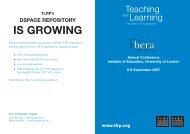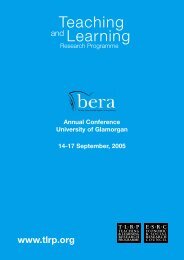Principles into practice: A teacher's guide to research evidence on ...
Principles into practice: A teacher's guide to research evidence on ...
Principles into practice: A teacher's guide to research evidence on ...
- No tags were found...
Create successful ePaper yourself
Turn your PDF publications into a flip-book with our unique Google optimized e-Paper software.
15recognises the importance ofprior experience and learning3Few people these daysthink that children arriveat school as “empty vessels”<str<strong>on</strong>g>to</str<strong>on</strong>g> be filled withknowledge. The principleof starting where children“are” and helping them <str<strong>on</strong>g>to</str<strong>on</strong>g> move<strong>on</strong> is widely recognised.Never-the-less, with a class of 25 or30, it can be difficult <str<strong>on</strong>g>to</str<strong>on</strong>g> determineeach <strong>on</strong>e’s starting point. The EPSEproject has found that carefullydesigned <str<strong>on</strong>g>to</str<strong>on</strong>g>ols, underpinned bysolid <str<strong>on</strong>g>research</str<strong>on</strong>g>, can quickly“diagnose” children’sunderstanding of key scienceideas and inform what the teacherdoes next.Pressure <str<strong>on</strong>g>to</str<strong>on</strong>g> cover an overloadedcurriculum makes it harder forteachers <str<strong>on</strong>g>to</str<strong>on</strong>g> find the time <str<strong>on</strong>g>to</str<strong>on</strong>g>diagnose individual chidren’sneeds, and a number of TLRPprojects challenged teachers’assumpti<strong>on</strong>s about some groups ofchildren. Teachers involved in theDeveloping Inclusive Practices inSchools project in England andWales began <str<strong>on</strong>g>to</str<strong>on</strong>g> see that they couldhelp change pupils’ attitudes, selfesteemand engagement withlearning; these were not fixed.Nati<strong>on</strong>al policy is beginning <str<strong>on</strong>g>to</str<strong>on</strong>g>recognise that local culture andenthusiasms can be built <str<strong>on</strong>g>in<str<strong>on</strong>g>to</str<strong>on</strong>g></str<strong>on</strong>g> thecurriculum. Excellence and Enjoyment,the 2003 Primary Strategydocument, encouraged this, as doesthe revised KS3 programme.TLRP’s Home-School KnowledgeExchange aimed <str<strong>on</strong>g>to</str<strong>on</strong>g> tap andrecognise the fund of knowledgethat children can draw <strong>on</strong> in theirhomes, communities and ethniccultures. Meanwhile the Scottishstudy, learning with ICT in Pre-School Settings found that the socalled“digital divide” between welloffand poorer families is not assignificant as is sometimes assumed.requires the teacher <str<strong>on</strong>g>to</str<strong>on</strong>g>scaffold learning4Scaffolding in teachingis like scaffolding inbuilding work; itsupports thec<strong>on</strong>structi<strong>on</strong> until thehouse (or the child’slearning) is secure enough <str<strong>on</strong>g>to</str<strong>on</strong>g> stand<strong>on</strong> its own. This scaffold is built ofteachers’ knowledge of howchildren learn.Scaffolding is about teachersrecognising when they shouldintervene <str<strong>on</strong>g>to</str<strong>on</strong>g> help the child move <strong>on</strong><str<strong>on</strong>g>to</str<strong>on</strong>g> a higher level of understanding.The TLRP ‘s Learning with ICT inPre-school Settings study found thatyoung children’s encounters withcomputers and other technologywere enhanced when practiti<strong>on</strong>ersstepped in <str<strong>on</strong>g>to</str<strong>on</strong>g> <str<strong>on</strong>g>guide</str<strong>on</strong>g> them. Teachersin turn learned more effectiveways <str<strong>on</strong>g>to</str<strong>on</strong>g> scaffold children’s learningthrough CPD.The InterActive Educati<strong>on</strong> studyalso c<strong>on</strong>cluded that ICT in theclassroom will not help learning <strong>on</strong>its own. “Without the support of ateacher, students are unlikely <str<strong>on</strong>g>to</str<strong>on</strong>g>develop their knowledge ofmathematical proof from theireveryday reas<strong>on</strong>ing, knowledge ofthe Italian Renaissance fromknowledge of popular culture… orknowledge of science from gamelikesimulati<strong>on</strong> software,” the<str<strong>on</strong>g>research</str<strong>on</strong>g>ers say.They found that students working<strong>on</strong> computers <strong>on</strong> their own for anextended period of time may comeup with odd informati<strong>on</strong>, ormisapply rules. For instance somesec<strong>on</strong>dary pupils using the internet<str<strong>on</strong>g>to</str<strong>on</strong>g> <str<strong>on</strong>g>research</str<strong>on</strong>g> the Renaissance werereading about somewhere calledFlorence in the USA.needs assessment <str<strong>on</strong>g>to</str<strong>on</strong>g> bec<strong>on</strong>gruent with learning5Assessment should helpadvance learning as well asdetermine whetherlearning has taken place.This may sound obvious,but many teachersinvolved in TLRP projects havecomplained that the assessmentsystem in England militates againstgood learning. When staff end up“teaching <str<strong>on</strong>g>to</str<strong>on</strong>g> the test” rather thanteaching <str<strong>on</strong>g>to</str<strong>on</strong>g> the principles theybelieve in (and the government saysit endorses), something is not right.However, TLRP findings havebegun <str<strong>on</strong>g>to</str<strong>on</strong>g> influence policy. The new21 st Century Science GCSE courselaunched in September 2006, isbased <strong>on</strong> EPSE <str<strong>on</strong>g>research</str<strong>on</strong>g>, and meldsc<strong>on</strong>tent and assessment in acoherent way.The project <strong>on</strong> pupil c<strong>on</strong>sultati<strong>on</strong>,in England, has shown that beingable <str<strong>on</strong>g>to</str<strong>on</strong>g> talk about their own learninghelps students become better able <str<strong>on</strong>g>to</str<strong>on</strong>g>manage it, more c<strong>on</strong>fident andpositive about educati<strong>on</strong> and able <str<strong>on</strong>g>to</str<strong>on</strong>g>c<strong>on</strong>tribute <str<strong>on</strong>g>to</str<strong>on</strong>g> the development of theschool. This pupil engagement givesteachers a deeper insight <str<strong>on</strong>g>in<str<strong>on</strong>g>to</str<strong>on</strong>g></str<strong>on</strong>g> theirpupils’ capabilities. A relatedproject, <strong>on</strong> assessment in NorthernIreland, makes the point that suchc<strong>on</strong>sultati<strong>on</strong> is an obligati<strong>on</strong> underthe UN C<strong>on</strong>venti<strong>on</strong> <strong>on</strong> the Rights ofthe Child.The Learning How <str<strong>on</strong>g>to</str<strong>on</strong>g> Learnstudy c<strong>on</strong>cluded that the ultimategoal of assessment for learning is <str<strong>on</strong>g>to</str<strong>on</strong>g>promote learning au<str<strong>on</strong>g>to</str<strong>on</strong>g>nomy so thatpupils can reflect <strong>on</strong> where they areand where they need <str<strong>on</strong>g>to</str<strong>on</strong>g> go, and thenact in such a way as <str<strong>on</strong>g>to</str<strong>on</strong>g> get there.ene <str<strong>on</strong>g>to</str<strong>on</strong>g> help the child move <strong>on</strong> <str<strong>on</strong>g>to</str<strong>on</strong>g> a higher level of understanding”s
















